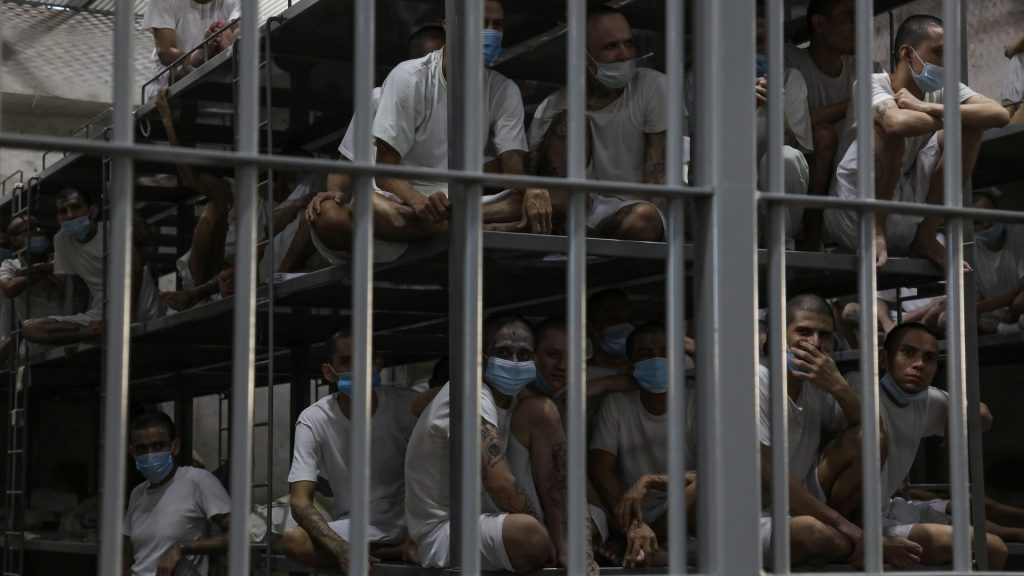Trump’s deportations to El Salvador may face legal issues over due process
Ella Greene April 25, 2025 0
At President Donald Trump’s directive, thousands of immigrants living in the U.S. illegally have been deported. Immigration officials believe that the men, many of which are Venezuelan and Salvadoran, are part of international crime gangs. Most have been sent to El Salvador and are being kept at the maximum security prison known as CECOT.
No due process?
The mass deportations have spurred questions over what rights these immigrants have in terms of the U.S. Constitution’s right to due process when charged with crimes.
In mid-April, the ACLU filed an emergency appeal with the Supreme Court to halt immigration authorities from deporting Venezuelans under the Alien Enemies Act of 1798. The ACLU argued that the deportations to El Salvador violated due process rights as individuals were not receiving a trial before being removed from the U.S. Federal officials contend that individuals with ties to foreign terrorist organizations like those Trump designated earlier this year do not have due process rights under the law.
The appeal came after the Supreme Court’s ruling that deportations can proceed only if each person is given a court date and a reasonable opportunity to contest their removal. Additionally, individuals cannot be imprisoned or punished without a fair trial.
What does federal law say?
According to federal law, the government can “detain and deport noncitizens who participate in criminal acts, are a threat to public safety or violate their visa.” The expedited removal process affords less time for individuals to exercise their due process rights, including legal representation. While deported individuals are typically returned to their country of origin, under Trump, they are being sent to El Salvador, where CECOT can hold them indefinitely. Consequently, the U.S. loses jurisdiction.
Civil rights advocates and attorneys are arguing that being sent to CECOT can be considered punishment because of the inhumane conditions previously documented at the facility.
UCLA law professor, Ahilan Arulanantham, told The LA Times, “Detainees share communal cells that can hold up to 100 men where they spend 23.5 hours per day; the cells contain no furniture beyond rows of stacked metal bunks without mattresses or pillows.”
He also adds they have no access to phones to call their lawyers or family members.
Alien Enemies Act of 1798
The Trump administration has used the Alien Enemies Act to justify deportations because of the wartime powers given to presidents to deport foreign adversaries quickly. As written, the law says that the president is authorized to remove those who aren’t permitted to reside within the United States in regard to public safety. The same statute says individuals are granted time to recover their goods or essentially get their affairs in order if they are not charged with a crime against public safety.
The extent of Trump’s authority under the Alien Enemies Act is yet to be determined by the Supreme Court. Federal judges in New York, Colorado and Texas courtrooms have issued various orders to block some deportations carried out by immigration officials.
On March 12, Trump signed an executive order invoking the Alien Enemies Act due to an “invasion” by the gang, Tren De Aragua. As stated in the order, “Alien Enemies shall be subject to removal to any such location as may be directed by the officers responsible for the execution of these regulations consistent with applicable law.”
Trump administration officials have long said all men detained and deported are gang members, but their affiliation with the group may not be direct grounds for deportation, which is why advocates argue they shouldn’t spend their lives in prison.
Related Stories
Ella Rae Greene, Editor In Chief
Ella Greene
Ella and the staff at Clear Media Project (CMP) curate these articles.
Unless otherwise noted CMP does not write these articles.
The views, thoughts, and opinions expressed in the articles published on this blog belong solely to the original authors and do not necessarily reflect the views of the blog owner. The blog owner does not claim ownership of the content shared by contributors and is not responsible for any inaccuracies, errors, or omissions.
All rights and credits goes to its rightful owners. No Copyright Infringement is intended. If you believe any content infringes on your rights, please contact us for review and potential removal.





